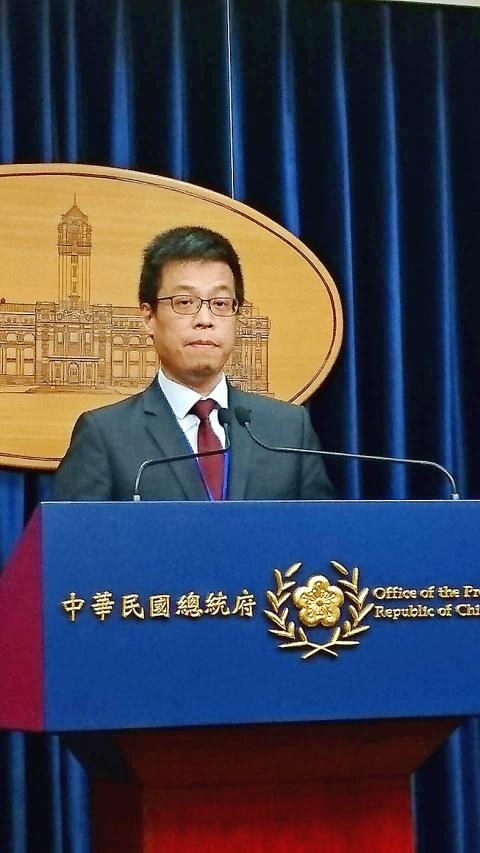Taiwan is not under China’s political control, the Presidential Office said yesterday in response to China’s blocking of Taiwan from attending this year’s World Heath Assembly (WHA) in Geneva, Switzerland.
“Taiwan is not a province that is governed by the People’s Republic of China [PRC]. The Republic of China [ROC] is a sovereign nation,” the statement said.
The ROC government does not recognize or accept the actions of the government of the PRC, the statement added.

Photo: Chung Li-hua, Taipei Times
Chinese National Health and Family Planning Commission Chairperson Li Bin (李斌) has all but closed the door on Taiwan’s participation at the WHO’s annual assembly until Taiwan accepts Beijing’s “one China” principle.
Speaking to reporters on Sunday, Li said that China had previously “agreed to let the Taiwan region attend” WHA meetings under a “special arrangement” based on acceptance of the “one China” principle, adding that the refusal of President Tsai Ing-wen’s (蔡英文) Democratic Progressive Party (DPP) to accept the principle “has destroyed the goodwill basis for the continuous attendance of the Taiwan region at the assembly.”
“It is the DPP itself which has set the barrier that has impeded the participation of the Taiwan region at the WHA,” Li said. “Only when the political basis that reflects the ‘one China’ principle has been confirmed can regular exchanges across the [Taiwan] Strait be sustained.”
Presidential Office spokesman Alex Huang (黃重諺) said China’s use of political reasoning to force the exclusion of Taiwan from international organizations would cause it to lose the support of the international community.
“The prevention of epidemics should have nothing to do with the borders of nations; the WHO belongs to the world,” Huang said.
Taiwanese are members of the global community and have the same rights to health as people elsewhere, he said, adding that Taiwan is committed to continuing working with the international community on health-related issues.
The Mainland Affairs Council yesterday said the government has never adhered to Beijing’s “one China” principle.
The council strongly criticized China’s “confusion of the international community and attempt to conceal the facts.”
Taiwan’s years of contributions to world health have been achieved through the hard work of the public and the government, and has nothing to do with the “one China” principle, it said.
“China will not achieve its political aims by pressuring Taiwan. Doing so will only cause the two nations to drift farther apart,” the council said.
The Ministry of Foreign Affairs said China’s insistence on adherence to the “one China” principle is unilateral and not in accordance with the facts.
The DPP said in a statement that as a sovereign nation, Taiwan’s right to join the WHO should not be unilaterally decided by Beijing.
Additional reporting by Chiu Yan-ling and AP

CHAMPIONS: President Lai congratulated the players’ outstanding performance, cheering them for marking a new milestone in the nation’s baseball history Taiwan on Sunday won their first Little League Baseball World Series (LLBWS) title in 29 years, as Taipei’s Dong Yuan Elementary School defeated a team from Las Vegas 7-0 in the championship game in South Williamsport, Pennsylvania. It was Taiwan’s first championship in the annual tournament since 1996, ending a nearly three-decade drought. “It has been a very long time ... and we finally made it,” Taiwan manager Lai Min-nan (賴敏男) said after the game. Lai said he last managed a Dong Yuan team in at the South Williamsport in 2015, when they were eliminated after four games. “There is

Chinese Nationalist Party (KMT) lawmakers have declared they survived recall votes to remove them from office today, although official results are still pending as the vote counting continues. Although final tallies from the Central Election Commission (CEC) are still pending, preliminary results indicate that the recall campaigns against all seven KMT lawmakers have fallen short. As of 6:10 pm, Taichung Legislators Yen Kuan-heng (顏寬恒) and Yang Chiung-ying (楊瓊瓔), Hsinchu County Legislator Lin Szu-ming (林思銘), Nantou County Legislator Ma Wen-chun (馬文君) and New Taipei City Legislator Lo Ming-tsai (羅明才) had all announced they

Nvidia Corp CEO Jensen Huang (黃仁勳) yesterday visited Taiwan Semiconductor Manufacturing Co (TSMC, 台積電), as the chipmaker prepares for volume production of Nvidia’s next-generation artificial intelligence (AI) chips. It was Huang’s third trip to Taiwan this year, indicating that Nvidia’s supply chain is deeply connected to Taiwan. Its partners also include packager Siliconware Precision Industries Co (矽品精密) and server makers Hon Hai Precision Industry Co (鴻海精密) and Quanta Computer Inc (廣達). “My main purpose is to visit TSMC,” Huang said yesterday. “As you know, we have next-generation architecture called Rubin. Rubin is very advanced. We have now taped out six brand new

POWER PLANT POLL: The TPP said the number of ‘yes’ votes showed that the energy policy should be corrected, and the KMT said the result was a win for the people’s voice The government does not rule out advanced nuclear energy generation if it meets the government’s three prerequisites, President William Lai (賴清德) said last night after the number of votes in favor of restarting a nuclear power plant outnumbered the “no” votes in a referendum yesterday. The referendum failed to pass, despite getting more “yes” votes, as the Referendum Act (公民投票法) states that the vote would only pass if the votes in favor account for more than one-fourth of the total number of eligible voters and outnumber the opposing votes. Yesterday’s referendum question was: “Do you agree that the Ma-anshan Nuclear Power Plant